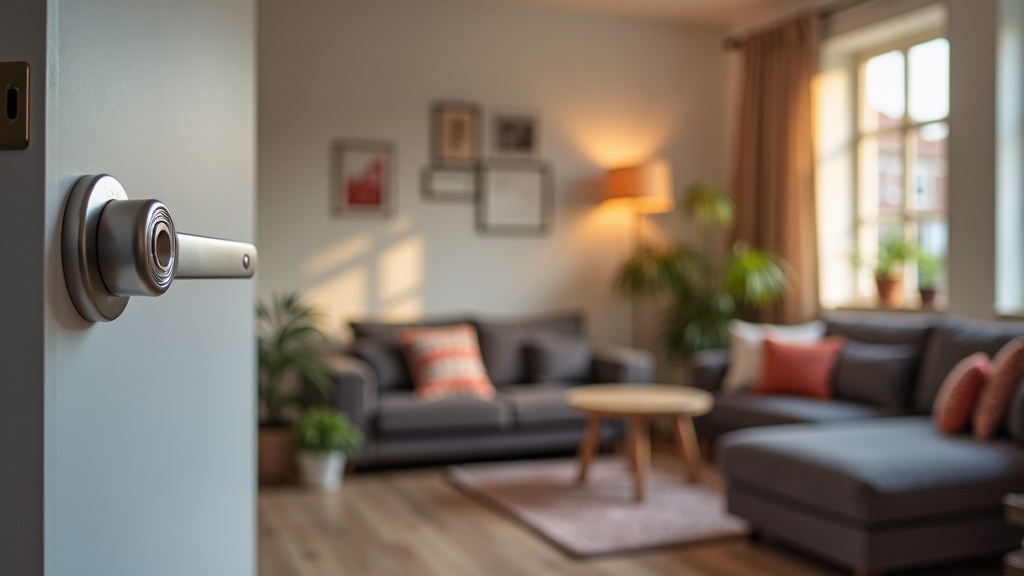Setting up an Airbnb can seem like a breeze at first, but keeping your property, and your wallet, protected is something to never overlook. With the rise in short term rentals, many hosts have realized that a regular home insurance policy just won’t cut it. That’s where Airbnb insurance and smart security systems step in to limit your liability and help avoid those nightmare scenarios you hear about in hosting forums.

Why Airbnb Hosts Need Extra Protection
Short term rentals come with unique risks, and the standard homeowner’s or renter’s policy rarely covers the kind of accidental damage or injury that can happen when you have a steady stream of guests. Airbnb’s built in coverage programs sound comforting, but there are gaps that sometimes leave hosts scrambling. Security systems and specialized short term rental insurance can fill these gaps, making hosting a whole lot less stressful and giving your property a real boost in safety.
Insurance claims from Airbnb-style rentals have climbed in recent years, with more people reporting property damage, noise complaints, and even legal troubles over injuries. The growing popularity of Airbnb has definitely made local rules stricter too. As a result, hosts are getting pickier about who stays and what tech protects their listings. For anyone thinking about hosting, recognizing these changes is key to avoiding surprises down the road.
Understanding Airbnb’s Insurance Options
Airbnb offers two main programs aimed at protecting hosts: AirCover for Hosts, and the Host Damage Protection program. These are good starting points, but they have some limits you need to be aware of if you want real peace of mind.
- AirCover for Hosts: This is automatically included with every booking. It advertises coverage for up to $1 million for property damage and liability if a guest gets hurt or a guest’s stuff gets stolen. But certain things, like cash, rare valuables, or shared spaces, aren’t always covered.
- Host Damage Protection: This helps if guests cause accidental damage, but it won’t pay out for maintenance issues, normal wear and tear, or damage from pets not allowed by Airbnb rules.
Careful research helps hosts spot the holes and decide if extra insurance or specific protection steps make sense. It’s always smart to read the fine print and even reach out to insurance providers for clarification. That way, any gaps in coverage are addressed before they become expensive issues.
How Smart Security Systems Reduce Liability
Having a smart security setup at your Airbnb not only discourages trouble but also gives you proof if something does go wrong. Here’s why lots of hosts invest in these systems to help secure their properties:
- 24/7 Video Monitoring (for main entrances and exteriors): Camera systems with cloud storage let you review what happened during check-in, loud parties, or if someone tries to sneak in unapproved guests. Just make sure your setup lines up with Airbnb’s privacy policy and only covers common areas.
- Contactless Smart Locks: With smart locks, you can control who enters and when. Every guest gets a fresh code, and there’s no risk of lost keys turning up later. This lowers the chance of break-ins and keeps a record of every entry.
- Noise and Occupancy Sensors: These devices detect when volume spikes or when there are more people than agreed upon. This is super useful for tackling unauthorized parties or overstays before they get out of hand.
- Integrated Alarm Systems: Burglar alarms connected to your phone provide real-time alerts if a door or window is forced, stopping problems before they escalate.
Combining these tools means you can step in quickly if needed and feel confident about what’s happening at your property without constantly worrying. Many guests also appreciate visible signs of security because it shows you care about their safety, too.
Choosing the Right Insurance for Airbnb Hosts
A specialized short term rental insurance policy is a good move for real peace of mind. Regular homeowner’s insurance usually won’t pay out for guest-caused damage or legal fees if someone sues you after a fall down your stairs. Here’s what to look for in a good short term rental policy:
- Liability Coverage: Covers medical costs, legal expenses, or settlements if a guest gets hurt on your property and blames you.
- Property Damage: Pays for repairs or replacement if guests cause accidental damage that goes beyond Airbnb’s built-in limits.
- Loss of Income: Protects your wallet if your rental can’t operate after a covered claim (like fire or major damage).
- Theft/Vandalism: Some policies include coverage if someone walks away with your TV or trashes your space.
- Extra Perks: Coverage for host liability even if you’re renting out a room or a shared space, and no penalty for having multiple guests cycle in and out.
Companies like Proper Insurance, Slice, and Safely are popular among hosts because they specifically tailor their coverage for Airbnb and other short term rentals. Many experienced hosts suggest getting quotes from several providers and reading reviews from other hosts before deciding. The right policy can give you true peace of mind and often covers more than you expect.
Common Airbnb Hosting Risks and How Security Systems Help
No guestbook ever reveals it all. Even if you screen carefully, accidents and bad behavior can happen. Here’s what to keep an eye out for and how smart security helps:
- Unauthorized Parties: Noise sensors and outdoor cameras detect when the guest count or sound levels spike, helping you step in quickly, often before there’s any damage.
- Property Theft: Security lighting and visible cameras have cut down on attempted theft. Smart locks limit who can get in, even after checkout.
- Neighbor Disputes: Camera evidence (always outside, for privacy) helps clarify noisy evenings or damage to shared spaces, keeping the peace and making insurance claims easier.
- Personal Injury Claims: Security footage can show what actually happened if a guest claims an injury, which makes liability disputes easier to handle for all sides.
Tech alone won’t prevent every issue, but it adds a strong layer of protection and helps both hosts and guests feel safer. Many property owners also say that having these systems allows for easier communication with guests about safety expectations up front and builds trust with neighbors who may worry about disruptions.
Extra Steps Hosts Can Take to Cut Liability
- Clear House Rules: Say it clearly what’s allowed and what’s not (like parties, smoking, or pets) in the listing and on the property. Smart home tech can help you enforce these rules fairly and consistently.
- Routine Maintenance: Regular safety checks, like fixing loose stair rails and checking smoke detectors, help avoid injuries and insurance headaches. Document everything with dated photos.
- Guest Screening: While Airbnb offers some screening, looking at guest reviews and communicating directly before accepting can flag potential issues early. Setting up an extra layer of screening for new guests or certain bookings helps nip problems in the bud.
- Privacy Signs: Be upfront about where cameras and sensors are. Always avoid installing these devices indoors or anywhere guests expect privacy.
- Local Legal Compliance: Double check local regulations regarding rentals and be sure you have the right permits or licenses. Staying up to date with rules in your area prevents legal troubles and costly fines.
Taking these actions not only manages liability but also demonstrates professionalism to your guests, which usually leads to better reviews and more bookings.
Frequently Asked Questions
Why are people no longer using Airbnb?
There’s been a lot of buzz about travelers, and even some hosts, stepping away from Airbnb lately. High cleaning fees, strict checkout instructions, and inconsistent standards are big reasons. Some folks also prefer hotels for guaranteed service and amenities. In some cities, new regulations and licensing nightmares have made it tough for small hosts to keep up.
How do I protect myself as an Airbnb owner?
Besides getting the right insurance, use smart security to monitor the property and control access. Keeping your listing updated, setting clear rules, checking guests’ reviews, and using platforms that offer support all help reduce risk. Documenting the property’s state before and after each booking is pretty handy for handling disputes.
Does Airbnb have a liability waiver?
Airbnb doesn’t directly offer a standard liability waiver that guests sign. However, AirCover for Hosts provides $1 million in liability coverage, which can help with legal or medical costs if a guest is hurt. Some hosts add an additional waiver or require guests to agree to extra rules when booking, but the legal strength of these varies.
What is the best insurance for Airbnb hosts?
Short term rental insurance from companies like Proper Insurance, Slice, or Safely is worth checking out because it’s designed for the risks of hosting. They usually cover areas that traditional homeowners insurance skips, like guest injuries and income loss from covered incidents. Coverage and prices vary based on your property and how often you rent it out, so comparing quotes and plans is really important before you make a choice.
Wrapping Up: A Smarter, Safer Hosting Experience
Airbnb hosting comes with its perks and pitfalls, but combining solid insurance with smart security tech is a practical way to keep headaches away. Nothing is foolproof, but being proactive helps protect your investment and your guests. By staying alert, planning ahead, and using technology wisely, you make hosting a more rewarding experience for everyone involved.
